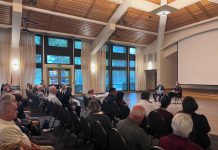In troubled times, it is too often easy to put pejorative labels on those who disagree with you. In recent speeches Secretary of Defense Donald Rumsfeld and Vice President Dick Cheney have labeled those questioning the war in Iraq as appeasers and House Republican Leader John Boehner has said Democrats who question the administration’s methods of interrogating and prosecuting terrorists are “more concerned about protecting terrorists than protecting the American people.” Boehner’s comments were so distasteful that even President Bush said he wouldn’t have said them the same way.
The American people have seen this type of political discourse in the past. It was prevalent throughout Vietnam and back in the 1950s in what is euphemistically referred to as The McCarthy Era. In a 1954 speech in Charleston, West Virginia, Senator McCarthy ever on the hunt for communist sympathizers turned his guns on the Democratic Party as a whole.
“The issue between the Republicans and the Democrats is clearly drawn,” said McCarthy. “It has been deliberately drawn by those who have been in charge of twenty years of treason. The hard fact is that those who wear the label Democrat wear it with the stain of a historic betrayal.”
Does Congressman Boehner really wish to be remembered in the same thought as Senator McCarthy? Is our political discourse so fragile that we must delve in the muck of traitorous name calling?
Consider this statement: “The American people realize this cannot be made a fight between America’s two great political parties. If this fight … is made a fight between America’s two great political parties, the American people know that one of those parties will be destroyed and the Republic cannot endure very long as a one party system.”
What is remarkable about the previous paragraph is that the words were spoken in 1952 by the same Senator Joseph McCarthy at an event in Milwaukee.
I think it is important that we never forget that our country – The United States of America – was founded on the dissent of our ancestors, and that one of our most cherished historical documents – The Declaration of Independence – was a protest document. It was for it’s time a revolutionary manifesto, which emanated from that dissent.
Discussions about the War on Terror and the War in Iraq are the right and responsibility of all our citizens. We all have a stake in their outcome. Those who feel that the War in Iraq is a mistake or is draining resources from the War on Terror are not disloyal, they are not appeasers, and they are not Islamist sympathizers. Nor are those who are vocal in their support for these battles blind supporters of the administration. All are patriots, who care enough about this country, the ideals on which it was founded, and the values for which it stands, to express their ideas in a national debate. You can disagree with their perspectives, but they have a right to express them.
In March 1954, the journalist Edward R. Murrow offered an enlightening perspective into the methods Senator McCarthy used in what has been historically labeled as his “communist witch hunt.” As he ended that broadcast – highly controversial in its day – Murrow’s closing homily reminded viewers of what this country stands for and how it is perceived in the world. His words remain valid today and should not be easily forgotten.
Murrow said, “We must not confuse dissent with disloyalty. We must remember always that accusation is not proof and that conviction depends upon evidence and due process of law. We will not walk in fear, one of another. We will not be driven by fear into an age of unreason. If we dig deep in our history and our doctrine, and remember that we are not descended from fearful men; not from men who feared to write, to speak, to associate and to defend causes that were, for the moment, unpopular. We can deny our heritage and our history, but we cannot escape responsibility for the result. We proclaim ourselves, as indeed we are, the defenders of freedom, wherever it continues to exist in the world, but we cannot defend freedom abroad by deserting it at home.”
David Cohen, a member of this newspaper’s editorial board, is a corporate speechwriter and former journalist.







